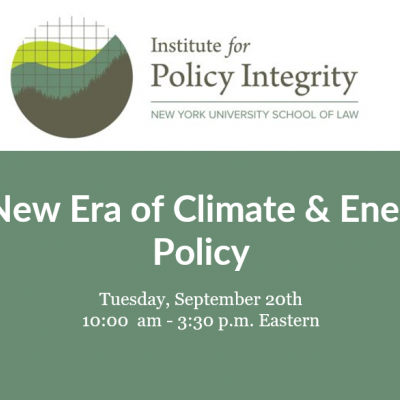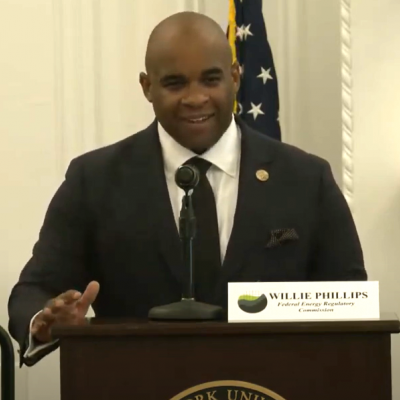September 30, 2022
September 2022 at Policy Integrity
- Richard L. Revesz Nominated to Lead OMB’s Office of Information and Regulatory Affairs
- Meet Our New Co-Executive Directors: Burçin Ünel & Jack Lienke
- The Inflation Reduction Act and Wholesale Clean Attribute Markets
- Conference Video Available: A New Era of Climate & Energy Policy
- The Latest on FERC’s Transmission Buildout
- More From This Month
-

Richard L. Revesz Nominated to Lead OMB’s Office of Information and Regulatory Affairs
This month, President Biden nominated Richard Revesz to serve as Administrator of the Office of Information and Regulatory Affairs (OIRA) within the Office of Management and Budget (OMB). Revesz, Policy Integrity’s founder and longtime director, is one of the nation’s leading voices in the fields of environmental and regulatory law and policy and has published extensively on federal regulatory issues. OIRA is responsible for vetting hundreds of regulatory actions each year, and, if confirmed, Revesz would oversee the agency’s work to ensure that these rules are robust enough to withstand inevitable legal scrutiny, wrote E&E News. Revesz’s Senate confirmation hearing was held on September 29. Revesz is currently on leave from the Institute for Policy Integrity.
-

Meet Our New Co-Executive Directors: Burçin Ünel & Jack Lienke
Economist Burçin Ünel and attorney Jack Lienke are co-directing the organization while Revesz is on leave. Previously Policy Integrity’s Energy Policy Director, Dr. Ünel leads our energy stakeholder involvement at the federal and state levels in front of regulatory agencies such as public utility commissions and the Federal Energy Regulatory Commission. Dr. Ünel has authored over 80 papers, policy briefs, public comments, and reports to improve the quality of governmental decisionmaking in numerous energy and environmental policy areas. Recently, Dr. Ünel served as a Senior Fellow in the Department of Energy’s Office of Policy, where she worked on domestic energy and climate policy issues, focusing on federal clean energy legislation, clean energy deployment, and infrastructure planning.
Jack Lienke was previously Policy Integrity’s Regulatory Policy Director. He has participated in dozens of regulatory proceedings before a wide range of federal agencies and filed amicus briefs supporting environmental, health, and consumer protections before numerous federal courts. Jack has particular expertise in the U.S. Clean Air Act and, with Revesz, wrote the book Struggling for Air: Power Plants and the “War on Coal,” which chronicles five decades of efforts by the Environmental Protection Agency to eliminate deadly air pollution from coal-fired power plants. Jack also serves as an adjunct professor at both NYU Law and Brooklyn Law School.
-

The Inflation Reduction Act and Wholesale Clean Attribute Markets
In a recent opinion piece for Utility Dive, Sarah Ladin and Burçin Ünel explore how the Inflation Reduction Act (IRA) will affect the ongoing debate over wholesale power markets and state policies that compensate clean energy resources. In recent years, some argued that state policy payments to clean energy resources will threaten the functioning of capacity markets (although Ladin and Ünel disagree), raising tensions between state decarbonization goals and wholesale markets. On the flip side, states and other stakeholders worry that wholesale markets are not accommodating state clean energy policies. Market operators have spent much of the last year debating mechanisms to curb these tensions and integrate state clean energy and decarbonization goals. The IRA may reduce the need for mechanisms such as a carbon price, a Forward Clean Energy Market, or an Integrated Clean Capacity Market by rapidly pushing down the price of state renewable energy credits. Thus, the IRA may reduce any real or perceived tension between wholesale markets and state policies, and the need for other mechanisms to harmonize wholesale markets and state policies, write Ladin and Ünel.
-

Conference Video Available: A New Era of Climate & Energy Policy
During Climate Week, Policy Integrity hosted a conference that brought together leaders from government, advocacy, and academia to discuss the state of U.S. climate and energy policy and environmental justice efforts in the wake of recent developments such as the Inflation Reduction Act and West Virginia v. EPA. The recording is now available here. Highlights from the event include Jeremiah Baumann, chief of staff at DOE’s Office of the Undersecretary of Infrastructure, explaining why estimates of the IRA’s climate spending dramatically understate the total scale of investment under the law, and WE ACT for Environmental Justice director Peggy Shepard assessing gaps in the Biden administration’s environmental justice efforts. Inside EPA recently discussed other parts of the conference.
-

The Latest on FERC’s Transmission Buildout
In a keynote speech at our conference, FERC Commissioner Willie Phillips stated that the Commission’s top challenge will be solving transmission and interconnection reform because the buildout of needed infrastructure for the energy transition will be costly and time-consuming. Phillips explained that FERC is considering removing the interconnection backlog by reviewing proposed projects not on a first-come, first-served basis, but a first-ready, first-served basis.
In response to FERC’s proposed transmission rulemaking, Policy Integrity submitted comments emphasizing the need for long-term transmission planning in the face of uncertainty and underscoring the advantages of using cost-benefit analysis in assessing new transmission projects.
-
More From This Month
- We submitted comments to the Connecticut Public Utilities Regulatory Authority (PURA) on its second annual review of its energy storage program. We encouraged PURA to adopt small changes to its incentive programs that would meaningfully decrease overall emissions, and advised the Authority to include societal impacts in its benefit-cost analysis.
- Sylwia Bialek and Burçin Ünel’s paper, “Impact of Imperfect Foresight on Optimal DER Deployment, Remuneration and Policy,” was published in Applied Energy. They co-authored the article with Jip Kim and Yury Dvorkin. The paper proposes a decisionmaking framework to optimize remuneration policy for renewable energy sources in transmission- and distribution-level marketplaces.
